No One's Going to Be Honest About Libya
At least they're talking about it?
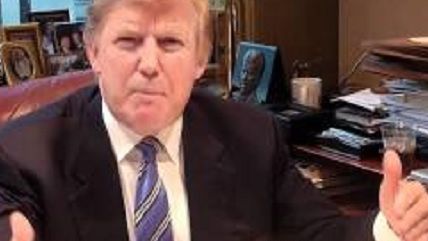
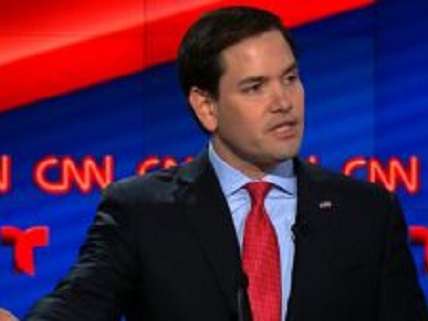
In a way, the mainstream debate over Libya is sort of like an exercise in avoiding the passive voice. The Libyan government collapsed. Weapons spread from Nigeria to Syria. People died. You've got your subject and verb, and little about actual responsibility.
"We didn't topple Qaddafi," Marco Rubio said at last night's CNN Republican debate, referring to the ruler of Libya until a U.S.-backed intervention in the Libyan civil war. "The Libyan people toppled Qaddafi."
The only choice for President Obama, according to Rubio, was whether it was going to "happen quickly" or "take a long time." Qaddafi was caught by Libyan rebels, with U.S. air support, sodomized and killed five months after the NATO intervention started. That delay (in getting the people of Libya to topple Qaddafi) Rubio said was where "'leading from behind' came from".
Of course, the Arab spring-turned-civil war in Libya started around the same time as the one in Syria, where the dictator Bashar Assad is still clinging to power. The U.S., and U.S.-backed rebels on multiple sides of the conflict, insist he must go.
Libya came up last night, actually, in an answer from Ted Cruz about the ceasefire arranged for Syria by the U.S. and Russia, to go in effect at midnight (5pm ET) tonight in Damascus. The ceasefire is an opt-in for the warring parties on the ground.
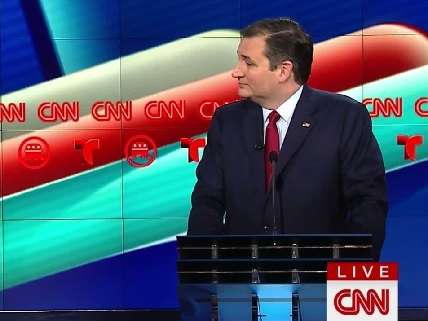
Cruz said there was "reason to be skeptical" about the ceasefire because of Russia's strengthened position due to "Obama's weakness in the Middle East."
Cruz argued only he could "lay out a clear difference" between himself and Hillary Clinton. "So for example, in Libya, both of them agreed with the Obama/Clinton policy of toppling the government in Libya," Cruz said. "That was a disaster. It gave the country over to radical Islamic terrorism and it endangered America."
But he didn't explain how his approach to Libya (making sand glow?) would be different or yield different results. Instead, he moved on to calling John Kerry "the most anti-Israel secretary of state this country has ever seen."
Donald Trump denied he supported toppling the Qaddafi government. Cruz said he would post evidence later, but didn't offer it at the debate.
Trump supported U.S. intervention to remove Qaddafi in a 2011 video blog, saying it would be "very easy and very quick."
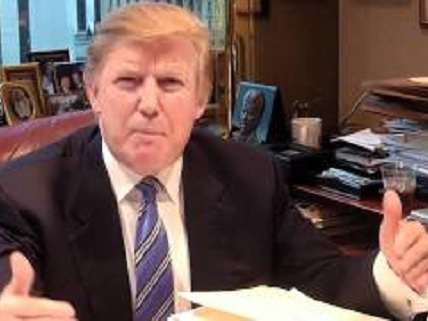
We could do it surgically, stop him from doing it, and save these lives," Trump said in 2011. "This is absolutely nuts. We don't want to get involved and you're gonna end up with something like you've never seen before."
Arguably, Syria fits that description, but I wouldn't expect Trump to pick up on that "told you so" moment. Would he take Rubio's route, and say it should have been done even faster and more surgically?
John Kasich, another Republican candidate for president, did bring up Syria in his answer.
"Libya didn't go down because there was some people revolution," Kasich said. "Hillary Clinton, Samantha Power and all these other people convinced the president to undermine Gadhafi. They undermined him, and now they have created a cesspool in Libya."
Now, Kasich argued, the U.S. was "gonna have to deal with" it, referring to the rise of the Islamic State (ISIS) in Libya. "Then we have ISIS in Syria, and we have ISIS in Iraq," he continued. "Because this administration has not had a strong and firm foreign policy, we are going to inherit, one of us here is going to inherit a total mess."
There was, of course, some kind of revolution in Libya, but Clinton and other liberal interventionists, like Samantha Power, did convince Obama to go along with calls from the United Nations, the European Union, and the Arab League to act in Libya. Members of Congress, including Rubio and Cruz, didn't do anything to asset their authority in the war decision-making process.
And how would a "strong and firm foreign policy" in Syria look different than Western action in Libya 2011? Topple Assad even faster? Kasich brought up Iraq too: the remaining Republicans candidates (who have something resembling policy ideas) argue that the U.S. should have remained in Iraq, which would have prevented the rise of ISIS, their way of shifting the blame from the U.S. intervention in Iraq in the first place.
Yet they also argue, as in last night's debate, that a (2011) intervention in Syria could've thwarted the rise of "radical Islamic terrorism" in that country. Yet an intervention in Libya in 2011 only helped ISIS eventually "gain a foothold" in that country. Ah, but Qaddafi was not removed quickly enough. There's no evidence the political aftermath would look much different with a few extra months of a political vacuum. Would the entire Middle East have to be occupied to prevent the rise of ISIS?
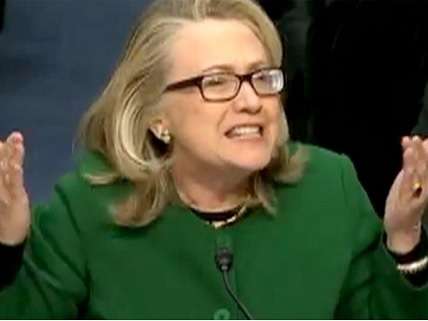
For her part, at this week's Democratic town hall Clinton touted the intervention in Libya as "the first coalition between NATO and Arab nations" and the kind of experience that qualifies her to be president. She expresses optimism about the political process in Libya, where they "actually held elections" and "elected moderates."
She mentioned "challenges internally coming from the outside with terrorist groups and other bad actors." Col. Qaddafi claimed in 2011 that Al-Qaeda would overrun Libya, saying the radical Islamists were backing many of the emerging rebels.
Clinton also blamed "internal disputes" on the continuing conflict in Libya (there are two rival governments vying for power), and said she supported current U.S. actions against ISIS in Libya. She said Libya had a "good election" and pivoted to pointing out the U.S. still had troops in places like South Korea and Germany—a similar argument to the one John McCain used in 2008 to defend keeping U.S. troops in Iraq.
Meanwhile, President Obama this week informed Congress the declaration of a "national emergency with respect to Libya" first issued five years ago would continue.
The notice repeated that the "unusual and extraordinary threat to the national security and foreign policy of the United States constituted by the actions of Colonel Muammar Qadhafi, his government, and close associates" against the people of Libya as well as the risk that he and his associates would "misappropriate" Libyan state assets necessitated the "national emergency."
"The situation in Libya continues to pose an unusual and extraordinary threat to the national security and foreign policy of the United States," the president's notice read, "and we need to protect against the diversion of assets or other abuse by certain members of Qadhafi's family and other former regime officials."


Show Comments (30)